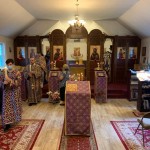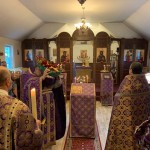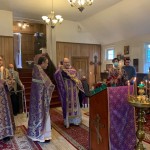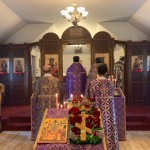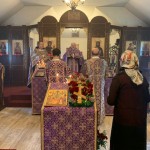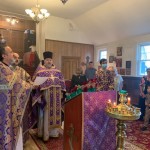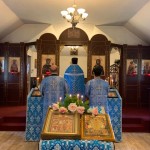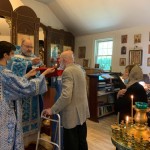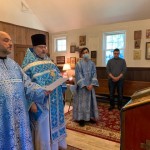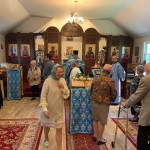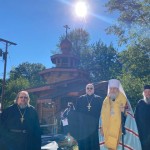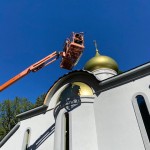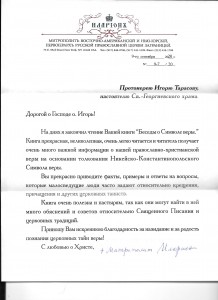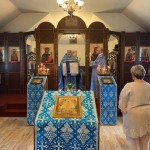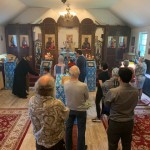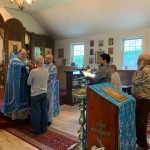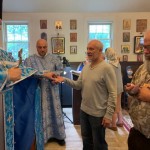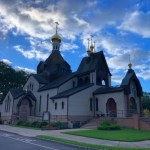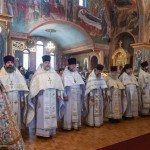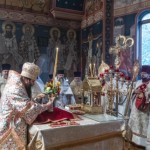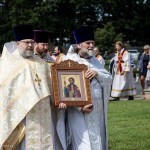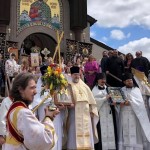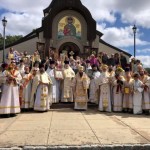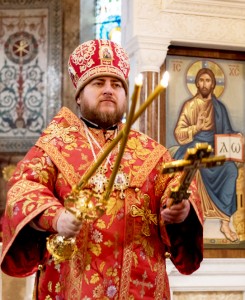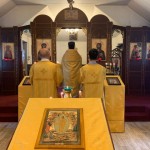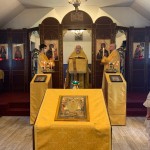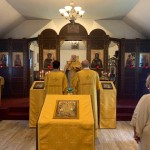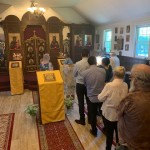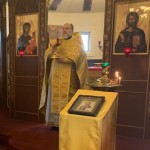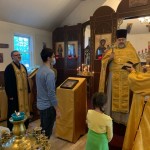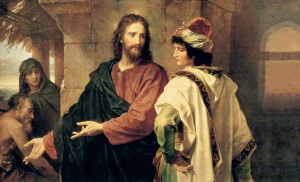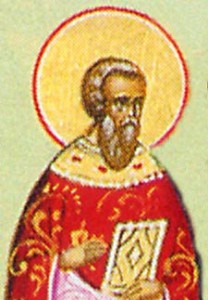On Sunday, September 27, our Parish family held celebration of the feast of the Exaltation of the Cross. The Rector of St. George Church, Archpriest Igor Tarasov headed the service in our temple. He was co-served by the ROCOR cleric, Priest Nenad Flora.
Before the reading of the Hours the clergy and altar servers performed a procession with the Holy Cross. They proceeded from the sanctuary to the middle of the church placing the Cross on the stand and then venerated it.
During the Divine Liturgy, after the Gospel lesson, Fr. Igor preached the following homily in English:
“Dear Father, dear brothers and sisters in Christ! My greetings to you on this great Lord’s holy day, feast of the Exaltation of the Precious and Life-giving Cross!”
“Today we commemorate how three centuries after our Lord was crucified, the Cross of Christ was discovered by the pious Christian people and following the order of the Holy Empress Helen. After being found on the Calvary in Jerusalem the Cross was exalted, elevated before the multitude of people by Archbishop Macarius. He exalted the Cross and blessed the people and the multitudes many times exclaimed the petition, “Lord, have mercy!” Today’s feast was established to remember that event and to honor the Holy Cross.”
“Today we also celebrate the Holy Cross as the main symbol of Christianity, the main emblem of our Christian faith, as well as the sacred and precious relic of the whole our existence. Many laudable and praising words were said and written about the Precious and Life-giving Cross. Our festal service today contains a lot of beautiful expressions about it. And we ourselves today honor the Cross by bowing our heads and bending our knees, by prostrating ourselves before it and by kissing that holy sign of our salvation.”
“Let us now reflect upon the mystery of the Holy Cross. It is a mystery because apart from being venerated, the Cross is very often may not be understood. Many people do not grasp the concept of God being crucified, killed. This is why Holy Apostle Paul wrote that “the message of the Cross is foolishness to those who are perishing” (1 Cor. 1, 18). Such people may ask why God who is Almighty, who is able to do anything, had to humiliate Himself by death on the cross? That is a mystery of the Cross. Our Lord Jesus Christ really humbled Himself by becoming Man. He condescended to our nature the moment He was conceived in the womb of His Blessed Mother. Then He only continued that humbling Himself through all His earthly life that was finished when He died on the cross for our salvation. To many people it is incomprehensible, but for us, Christians, it is the truth of our salvation. As St. Paul says, “we preach Christ crucified… the power of God and the wisdom of God” (1 Cor. 1, 23-24).”
“To reveal that mystery we may say that the Cross of Christ was a sign of how mankind was far from God. The Son of God came to the humanity to accomplish good works, to teach, to heal the sick, to raise the dead, to show the true way of salvation. But the humanity condemned Him to death and crucified Him. It happened because every time when God’s law of love takes over, it puts an end to human pride, to human self-exaltation, to human selfishness. Christ was God’s Love incarnate. And that Love revealed and chastised human falsehood, and that falsehood began to retaliate. Thus many people condemned Christ. They showed how far from God men could be.”
“On the other hand, the mystery of the Cross, as we realize, shows us the great love of God towards mankind. As some people think of the Cross as of “foolishness” or “insanity”, we may say that God “insanely” loves us. He loves us despite our sins, our shortcomings, our transgressions and our being evil. God wishes to free us from sin, from our evil state. The world does not recognize love towards the enemy, but God does. Every sinner becomes God’s enemy but God still loves him. And God proved that love on the cross.”
“Dear brothers and sisters! Let us come and worship Christ the Crucified, our God who loved the world, so he offered Himself for us on the Precious Tree of the Cross. Let us admire and understand the mystery of the Cross, the mystery of God’s infinite love towards us, the sinners. Let us respond to that love by our own love, by our repentance of sins and by our strife for piety and life with Christ. Let us avoid exaltation of our proud and selfish nature but let us exalt the Precious Cross of Christ in our lives – today and always!”
During the Litany of Fervent Supplication, the Rector proclaimed a petition beseeching the Lord to spare the faithful from the outbreak of the disease.
The choir prayerfully performed hymns of the Exaltation of the Cross before Holy Communion.
After the dismissal of the Liturgy the clergy and the altar servers performed glorification of the feast and veneration of the Cross in the middle of the church. Then Fr. Igor preached a short sermon in Russian and made some announcements.

